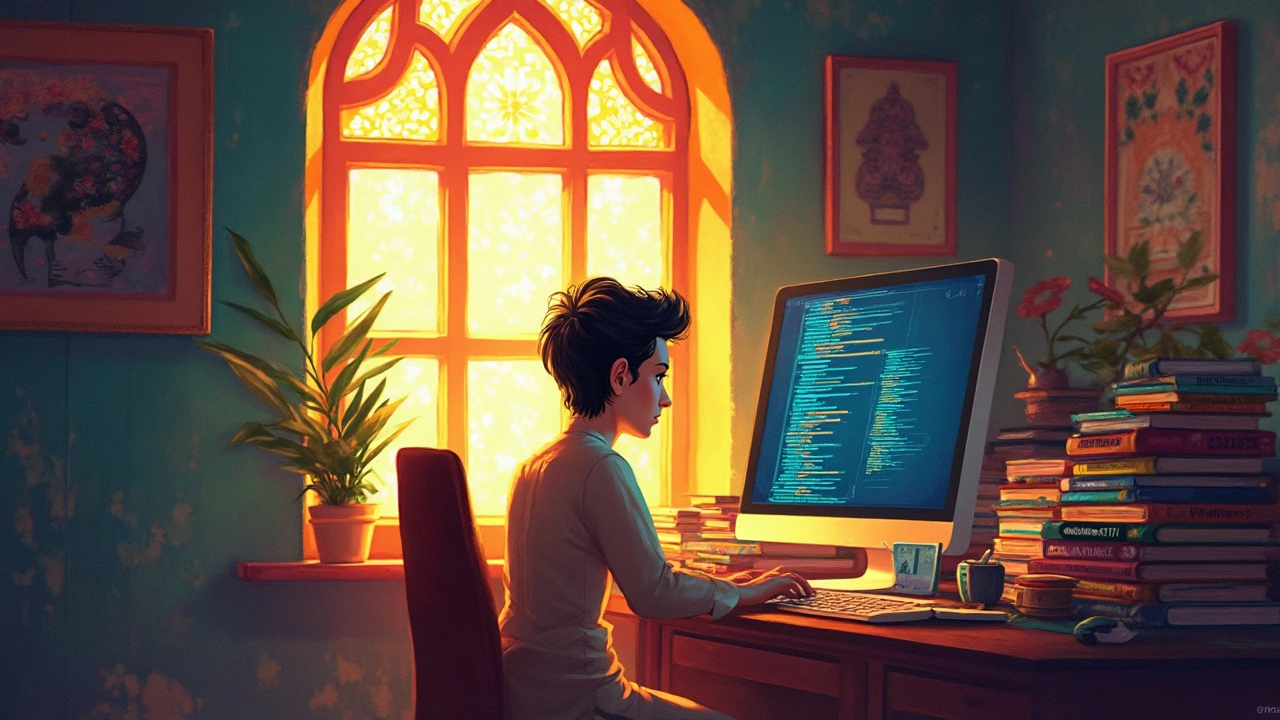
Ever found yourself confused about what really sets coding apart from programming? You're not alone! These terms get tossed around a lot, but they aren't quite the same thing. Think of coding as learning a foreign language for computers. You're using specific instructions to communicate directly with them. Programming, though, is more like planning out a big project where coding is just one part of the job.
Coding is all about writing those lines of code that make software tick. It's like writing sentences in a language that machines get. Programming, on the other hand, is like crafting a blueprint. It involves problem-solving, designing solutions, and making sure everything runs smoothly together. So, while coding is integral to programming, programming itself is a wider concept.
If you've ever toyed with the idea of delving into the tech world, understanding this distinction could save you lots of head-scratching moments. Whether you're deciding on your first coding class or aiming for a deeper dive into software creation, knowing where you're heading can make all the difference.
- Defining Coding: The Basics
- What is Programming?
- Key Differences
- Real-world Applications
- Skills Required
- Tips for Beginners
Defining Coding: The Basics
Coding is often the first step when you're learning to create software or apps. Think of it as learning a new language, but this time, it's a language that computers understand. When you code, you're essentially writing a set of instructions that a computer will follow to perform specific tasks.
At its core, coding is all about precision and clarity. Computers don't do well with guesswork, so every command needs to be spot-on. This is where programming languages come into play.
Popular Coding Languages
There are several coding languages that are widely used today:
- Python: Known for its readability and straightforward syntax. Great for beginners!
- JavaScript: The language of the web, used for making interactive web pages.
- Java: A versatile language commonly used in large systems and mobile apps.
- C++: Used in game development and applications that require fast performance.
Each of these languages has its specialties and areas where they shine. Depending on what you want to build, you might choose one language over another.
Getting Started with Coding
If you've never coded before, it might feel a bit like learning to drive—you need to understand the basics before you can hit the road. Here are a few tips to get you started:
- Start Small: Begin with simple exercises and gradually work your way up to more complex projects.
- Practice Regularly: Coding is a skill, and like any skill, consistency is key.
- Learn from Mistakes: You'll run into errors. Debugging is part of the learning process.
The beauty of coding lies in its simplicity. You're turning thoughts into structured sequences that a computer can execute, which is pretty amazing when you think about it. As you continue your journey in coding classes, keep in mind that patience and practice will go a long way toward mastering this essential tech skill.
What is Programming?
So, what's the deal with programming? It's more than just writing code. Think of it as a whole process that involves designing and creating applications and systems. While coding is about writing instructions for computers, programming is about taking those ideas and making them a reality.
The programming process usually starts with identifying a problem and coming up with a solution. This involves creating algorithms— sequences of steps or rules to get the job done. Once you've nailed down your logic, that's when coding comes into play.
Bringing Ideas to Life
Programming rolls in several other stages. You’ve got debugging (finding and fixing errors), testing to ensure everything works smoothly, and even looking out for security issues. It's like taking care of the whole package, not just delivering a script.
In the real world, programming can build anything from simple mobile apps to complex operating systems. Different languages are used depending on what you're creating. Python, for example, is popular for web applications and AI. Java is often picked for large systems like Android apps.
Programming Languages Variety
There are tons of languages to choose from, and each comes with its own set of pros and cons. Want to build a website? Many developers turn to JavaScript. Thinking of diving into backend software? Give C++ a try. Here’s a simplified look:
- Python: User-friendly, great for beginners, widely used in AI and big data.
- Java: Object-oriented, ideal for large-scale projects.
- JavaScript: Essential for web development, both client-side and server-side scripting.
- C++: Offers fine control over system resources, used in game development and high-performance applications.
So, if your aim is to do more than just write code, programming might be your thing. Equip yourself with the right skills, and you'll be creating software that makes people's lives easier (or at least more entertaining) before you know it.
Key Differences
So, what's the real difference between coding and programming? Let's break it down so you can see where they diverge and how they're connected. Both are super important in the world of software development, but they serve different roles.
Code vs. Plan
Coding is all about writing the specific instructions in a language that a computer can follow. It's like handing someone a recipe to follow to a T. On the flip side, programming is more like being the chef who plans the menu, sources the ingredients, and decides what goes on the plate. It's about problem-solving and designing how software should work.
Skills Required
With coding, you'll focus on syntax, writing clean and error-free code. You'll need a good grip on a language like Python, JavaScript, or C++. For programming, the skills stretch further. You'll dive into understanding algorithms, logic, and maybe even management skills if you're working on a bigger software project.
Scope
In terms of scope, coding is a slice of the bigger pie that is programming. It deals with the actual 'typing' of the instructions. Programming wraps in the entire process from brainstorming the project requirements to testing and making sure the final software runs without a hitch.
Tools and Environment
| Aspect | Coding | Programming |
|---|---|---|
| Tools | Code editors, IDEs | IDE, debuggers, compilers |
| Environment | More static, desktop-based | Dynamic, covers desktop to cloud |
While both use tools, the complexity and range change. Coding usually involves editors or IDEs where you can write and initially test code. Programming, however, might need you to use debuggers, version control, and even collaboration tools, especially if you're working in a team.
Understanding these key differences can help shape your learning path whether you decide to start with a few coding classes or aim to master programming principles. This knowledge can help guide your career, making sure you're acquiring the right skills for the job you want in the tech field.

Real-world Applications
So, how does all this coding and programming stuff play out in the real world? Glad you asked! It’s everywhere – in everything from the cars we drive to the way we order our Friday night pizza.
Let’s start with coding. Coders work on the nuts and bolts of software development. They write the coding instructions that computers follow to execute all sorts of tasks. Think about the apps on your phone. Every time you tap on an icon, coders have worked hard behind the scenes to make that app run smoothly. Games, social media, and even those fitness trackers you’re so fond of owe a lot to these guys.
Scripts in Action
If you've ever interacted with a website, chances are you've been involved with a script. Web developers use coding languages like JavaScript to make sites interactive. You know those cool effects when you hover over buttons or the seamless way a page scrolls? That’s JavaScript doing its thing!Now, onto programming. Programming takes the practical application of coding a step further. It involves thinking about how different pieces fit together, optimizing performance, and fixing bugs.
Building Software Solutions
Programmers create software solutions by blending algorithmic thinking with real-world needs. This means designing systems that not only function well but also offer a great user experience. Take e-commerce platforms like Amazon. They rely on complex programming to manage everything from user data and product searches to payment processing.And let's not forget about big players like Google, Microsoft, or Facebook. These companies employ thousands of programmers every day to innovate and improve their platforms. They use programming to handle vast amounts of data, enhance security, and ensure apps run efficiently across different devices.
In many tech companies, coders and programmers often work side by side. Coders handle the immediate instructions, and programmers focus on overall functionality and user experience. It all comes together, making our digital lives easier and more exciting.
Got a smartphone in your pocket? You’ve got coding and programming to thank for that mini-computing powerhouse that lets you do everything from browsing the web to editing videos on the go!
Skills Required
So you're thinking about diving into coding or programming? You're gonna need some specific skills to succeed in these areas. Let's break down what you’ll need to get off on the right foot.
Understanding the Basics
For starters, you need a good grasp of the basics. Knowing your way around a programming language like Python, JavaScript, or C++ is a must for coding. These languages are like the building blocks you'll use to communicate with computers.
Problem-Solving Abilities
Both coding and programming demand strong problem-solving skills. You'll run into challenges, and your knack for figuring out solutions will be key. This means sometimes you'll play detective, sifting through code to find pesky bugs or glitches.
Logical Thinking
Get ready to think logically. Programming especially requires you to design systems and workflows that are efficient and effective. This isn't just about writing code; it's about making sure everything fits together logically.
Creativity
Believe it or not, creativity comes in handy too. Whether you're coding up a new feature or programming the design of an entire application, thinking outside the box can lead to innovative solutions and cool end products.
Continuous Learning
The tech world is always evolving, so a willingness to keep learning is crucial. New languages and techniques are always popping up, so staying updated will make your skills relevant. Trust me, the learning doesn’t stop!
Teamwork
With larger projects, you'll usually find yourself working on a team. Good communication and teamwork skills go a long way in ensuring everyone's ideas and efforts come together smoothly.
Here's a quick glance at the skills you might find useful:
- Coding: Language proficiency, debugging abilities, patience
- Programming: System design, algorithm development, project management
Some like to separate the two fields, and this table below shows how employers might view these skills differently:
| Skill | Emphasis for Coders | Emphasis for Programmers |
|---|---|---|
| Language Proficiency | High | Moderate |
| Logical Thinking | Moderate | High |
| Problem Solving | High | High |
| Learning Agility | High | High |
Whether you choose coding or programming, these skills are your passport to a rewarding journey in tech. Start building 'em up, and you'll be well on your way!
Tips for Beginners
Dipping your toes into the world of coding and programming? It can feel a bit overwhelming, but don't worry. Let's break it down to help you kick off on the right foot.
Start Small
Don't pressure yourself to absorb everything at once. Begin with simple projects that match your interest, maybe a basic website or a simple app. As you get the hang of the basics, you'll naturally start tackling more complex tasks.
Pick the Right Language
Choosing your first programming language is like deciding which instrument to learn first. Some popular choices include Python for its simplicity and JavaScript for building websites. Both are beginner-friendly, but pick one that aligns with your goals!
Join a Community
There are tons of online communities where you can connect with other learners. Websites like GitHub, Stack Overflow, or even Reddit can be goldmines for advice, troubleshooting, and motivation. The coding community is full of helpful folks willing to lend a hand.
Practice, Practice, Practice
Like learning to ride a bike, coding gets easier with practice. Try coding a little each day, even if it's just a snippet of code. This consistency will build your confidence and improve your skills over time.
Use Online Resources
The internet is brimming with free resources to boost your skills. Websites like Codecademy, freeCodeCamp, and Coursera offer free courses spanning different levels and coding languages.
You can also find video tutorials, e-books, and articles tailored to your learning style. Explore and figure out what helps you learn best.
Don't Fear Mistakes
Trust me, errors in coding and programming are inevitable, especially as a beginner. Mistakes are a fantastic learning tool, helping you understand what went wrong and why. Embrace them as you progress.
With these tips, you're well-equipped to embark on your coding journey with confidence. Remember, every programmer started right where you are now!





